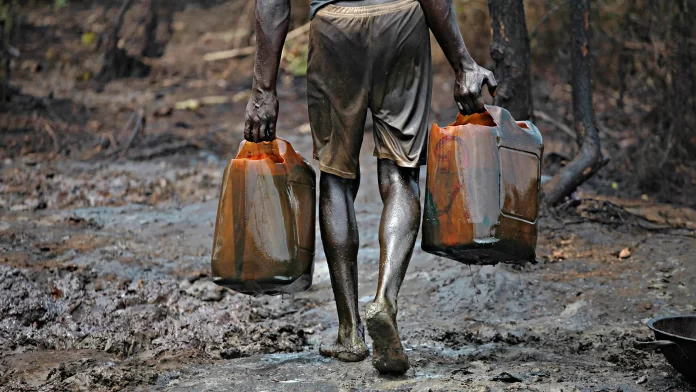Stolen Oil In Nigeria Outstrips Amount Sold Legitimately, NMGS Alleges
The Nigerian Mining and Geosciences Society (NMGS) has lamented that oil theft has attained the status of a Frankenstein monster to the extent that the quantum stolen now outstrips what is left to be sold legitimately.
The president of NMGS, Akinade Olatunji, while speaking after his installation as the 32nd president of the society, in Ibadan, the Oyo State capital, called for a holistic approach to curb the menace. Olatunji said increasing security surveillance could not solve oil theft, stressing the need for communities to imbibe a sense of ownership of the assets in their domains.
He said the approach of giving tokens to communities who are aware of the humongous resources being carted away from their lands does not engender patriotism and a sense of belonging. Olatunji, therefore, called for strategic and deliberate actions directed at ensuring that the communities own or co-own the assets.
He said: “The Oil producing communities in Nigeria are overdue for a sort of marshal plan that will transform them from the ghetto setting to the glamorous setting they have seen in cities built with money from their resources.
“The amount of resources allocated to oil communities in the Petroleum Industry Act (PIA) is not sufficient to guarantee the kind of safety on investment that is required for the continuous survival and profitability of the oil and gas sector in the long run.
“This is an aspect of the PIA that needs to be urgently amended otherwise the entire prospects expected of the Bill may be jeopardised. We must think without the Box in fixing this problem.
This had lingered for too long.
“The celebration and excitement that greeted the enactment of the Petroleum Industry Act 2021 was an indication that the sector was overdue for a thorough reform. The PIA has unleashed a new set of vigour, energy and enthusiasm into the sector.
“The NMGS is of the view that the PIA should be made to work. There is no perfect law; we can only know the weaknesses when we use the law. The identified weaknesses can then be fixed and reinforced by appropriate amendments from the National Assembly. The NMGS is glad that the PIA is a great attempt at removing the opacity and inconsistencies that have characterised the Oil and Gas sector in the Country in the last 20 years.”
Speaking on the need to reform the solid mineral sector, Olatunji said the potential in the sector is humongous and stressed the need to move away from the ‘scavenging’ mentality to scientific data-driven mining.
He said the modicum of successes achieved in the sector so far is down to the determined efforts of their members heading key agencies at the federal level, who despite all the challenges have remained committed professionals who are devoted to making a difference in their calling.
“The NMGS is indeed proud of them, and we know they can do much more if the political backing is there for them to function.” He added, “At the Federal level, there is a Road Map designed for the Solid Mineral Sector which was based on the Nigerian Minerals and Mining Acts 2007. The Road Map is a Comprehensive document produced by panels of experts including members of the NMGS. The Road Map is very robust, and it showed clearly what our aspirations should be as a nation that wants to be taken seriously in the solid mineral sector. There are enshrined Key Performance Indices (KPIs) in the document that can be used to measure the progress of all key participants in the implementation of the Road Map.
“The NMGS is of the view that it is time to benchmark all that has been done in the last 10 years against the KPIs. We cannot continue to go down the road without assessing how well we are doing in implementing the key reform agenda for the sector. The assessment is necessary to allow for the corrections of missteps and strengthening of any weak link identified in the implementation.”





